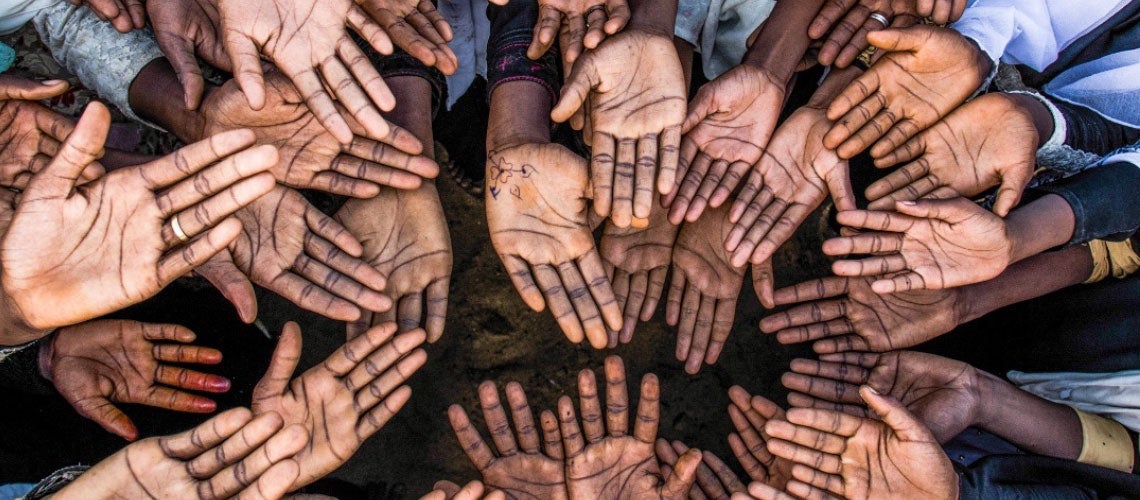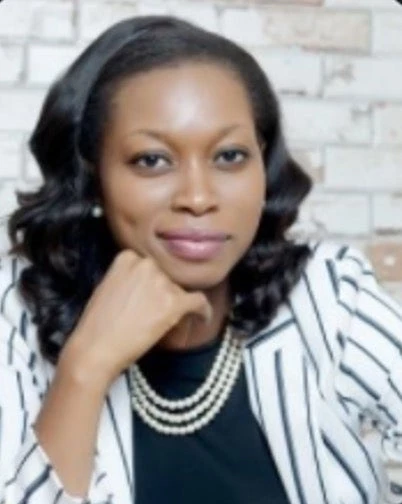 Hands of young girls studying at a safe space in the Welcome Center in Am Timan, Chad. Photo: Vincent Tremeau/World Bank
Hands of young girls studying at a safe space in the Welcome Center in Am Timan, Chad. Photo: Vincent Tremeau/World Bank
Authors of this blog: Dr. Aline Simen-Kapeu, Dr. Amaka Momah-Haruna, Ndèye Seynabou Diouf, Nydiane Razafindrahaingo, Sam Agbahoungba, Uilrich Inespéré Waffo.
Imagine a 12-year-old girl, named Merah, who aspires to be a female legislator in her country when she grows up but who cannot continue her schooling because there is no secondary school in her community. She and other girls like her are not allowed to shuttle back and forth to neighboring communities to attend school, unlike their brothers, who are allowed to. Besides, her father has told her that going to school will interrupt her early marriage, scheduled for next year, another factor dashing her dreams. Merah comforts herself by thinking there have only ever been two female members of parliament in her country anyway, so her dream is unlikely to happen.
Now imagine millions of girls globally like Merah, a fictional character in a fictional country typical of many, who lack agency and are stuck in a cycle of social, economic, and political disempowerment.
The current realities
The 2022 Global Gender Gap Report shows that, at the current rate of progress, it will take another 132 years to close the existing global gender gap between male and female, that is the disparity between women and men across health, education, politics and economics. Merah would be one of the 12 million (one in every five) girls globally, who are forced into marriage or similar unions every year before reaching the age of 18. The highest levels of child marriage can be found in Sub-Saharan Africa, where that number doubles, and where 40% of girls marry before the age of 18.
For girls who can complete their education, less than half will contribute to the global labor force, a difference of 25 percentage points compared to men. Merah’s 18-year-old sister could be one of the 736 million women and girls (over the age of 15 worldwide) to have been a victim of gender-based violence. If she lived in West Africa, she would be included in the staggering 50% of at least 200 million women and girls, aged 15-49 years, who have undergone female genital mutilation in 31 countries where the practice is concentrated.
Only one out of three women with a childhood dream like Merah’s will get leadership positions in sectors such as politics, business, public administration, and academia. Equal representation of women and men in parliament may take another 40 years. Even though the level of parity in political empowerment in Sub-Saharan Africa countries like Rwanda, South Africa, and Mozambique has substantively improved from previous years, we cannot afford to wait around for another four decades to enjoy the numerous benefits that a gender equitable world has to offer.
Gender equality is a basic human right which promotes a woman’s sense of self-worth, strengthens her capacity to express herself and make informed decisions, and has positive knock-on effects for her family and community. Gender equality also promotes economic growth; it is estimated that the achievement of gender equality globally would raise global Gross Domestic Product (GDP) by up to $28 trillion. Gender equality increases girls’ access to education and reduces the likelihood of child marriage by five to six percentage points, ultimately reducing fertility rates and population growth in some of the world’s poorest countries. It is also fundamental to achieving Goal 5 of the 2030 Sustainable Development Goals.
Stronger together: All put our hands on deck
Gender equity needs its allies. Allies who can advocate for change and who can challenge biased behaviors and build an environment where everyone can advance and succeed while not undermining the agency, voice, and leadership of women and girls. A good example of where allies continue to make a significant contribution is the Sahel Women's Empowerment and Demographic Dividend (SWEDD) project, funded by the World Bank and its partners. The project aims at keeping girls in school and improving their life skills, as well as at expanding economic opportunities for adolescents and young women, reducing gender-based violence, and increasing access to sexual and reproductive health services.
Men are essential allies to achieving gender equity, especially at community level. In settings where men are actively engaged, remarkable results can be made.
- For example, SWEDD countries, including Burkina Faso, have established over 1,500 community-based “husbands’ schools,” which are powerful male forums for the exchange of accurate information and for peer-to-peer counseling to promote the involvement of men, who tend to hold the key decision-making roles within family units and the wider community.
- In the Democratic Republic of Congo, all primary school male teachers, male and female, in provinces targeted by the World Bank, have signed a revised Code of Good Conduct that prohibits sexual exploitation, abuse, and harassment. In 2022, about 20,000 male and female school staff were appointed focal points for safety and inclusivity in these provinces to enforce implementation.
Governments are strategic allies too, as they can apply gender responsive principles in the management of public resources and instruct partners to generate gender-disaggregated data that foster an enabling environment for women to thrive. Governments must pay particular attention to the modernization and enforcement of legislation to better protect women’s rights and to fight against gender-based violence.
- In Chad and Niger, political commitment from government was critical in the creation of a national monitoring and accountability mechanism that looks at the demographic dividend and provides data essential to evaluate the outcomes of interventions.
Private companies, though sometimes overlooked, are key allies. They can structure workplace policies, such as parental and family leave, flexible hours, and anti-sexual harassment policies that create a more work-friendly environment for women.
- The joint International Finance Corporation and Nigerian Exchange Limited Nigeria2Equal initiative is rallying some of Nigeria’s largest companies to increase women’s participation in private sector development by implementing gender-smart solutions to reduce gender gaps in leadership, employment, and entrepreneurship, and to promote gender equality to help improve business performance.
Civil society organizations are indispensable allies as they hold governments accountable for translating their commitments into law and their policies into implementation and enforcement.
- In the SWEDD countries, collaboration with networks of young people in the Sahel has enabled the wide dissemination of messages on social and behavior change that have strengthened awareness, both around social norms and practices biased against women.
How can we accelerate advancement for women and girls?
Obviously, the advancement of women at social, economic, cultural, and political levels is pivotal in ensuring sustainable and inclusive growth for the benefit of all societies. Efforts to achieve equality should therefore not only be a matter for women and girls in isolation. It will take all of us working together to achieve gender equality once and for all. Everyone has a role to play. Let’s join hands to achieve full equality for women, and for young girls just like Merah.
The authors are part of a cohort of Women and Girls Empowerment Specialists working on scaling-up and increasing the impact of the World Bank’s support to country teams and government partners in the Africa region. Their scope of work includes policy dialogue, coordination between government agencies and development partners, and internal and external advocacy and knowledge building around issues on investing in girls’ and women’s empowerment.


Join the Conversation